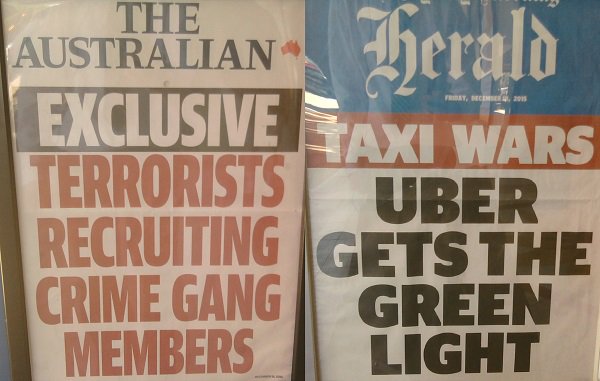December 19, 2015
Horse 2045 - Uber: Declaring War Against Taxpayers
I saw these two ad boards out the front of the newsagent where I work and couldn't help but tie these two stories together in my mind. The people at Fairfax and News may have thought that they were reporting about two entirely different issues but just as all novels belong to their readers, the news which is also composed of stories, is also consumed by readers who are then free to construct new narratives.
This week I had the misfortune of being stopped in the street by people in fancy dress and claiming to be from the The Coalition of Obsolete Industries. In reality they were from the Taxpayers' Alliance and had organised their farce as a protest against the compensation which the Taxi Drivers' Union of NSW has won, in the wake of Uber being declared legal in the state of NSW.
I've come across the Taxpayers' Alliance before and although their pitch revolves around individuals paying less tax, when pressed they are suspiciously vague about where the resulting shortfall would come from; to the point of defending multinational corporations' stance of not paying any tax at all despite extracting profits from various countries.
People who like to tout the virtues of free market capitalism of wheel forward Adam Smith's 1776 book "The Wealth of Nations" and that off quoted passage which is used as a justification for "rational" self-interest:
It is not from the benevolence of the butcher, the brewer, or the baker that we expect our dinner, but from their regard to their own interest.
As is often the case with people who have a barrow to push, they often haven't read the source material they're citing and miss the larger points of the work.
Smith was writing in a political and economic environment which was dominated by agrarian estates and apart from the government and clergy (which still had some sway in the late eighteenth century), it was these estates and the landed gentry which actually held the most real power in terms of governance. Smith does talk about liberal ideas to do with individuals gaining the benefits of their own industry (and he does this alongside other thinkers of the day like John Locke) but both "The Wealth of Nations" and his 1759 work "The Theory of Moral Sentiment" align this with people's broader obligations to live within society. Those obligations also include paying tax:
The subjects of every state ought to contribute towards the support of the government, as nearly as possible, in proportion to their respective abilities; that is, in proportion to the revenue which they respectively enjoy under the protection of the state.
The thing I find confusing about the Taxpayers' Alliance putting on their little farce in the streets of Sydney, is if they supposedly are fighting for a "fairer" taxation system, then why are they defending a firm who has categorically decided not to follow the same rules as everyone else?
Uber has always maintained that they are not an employer and that the people who work for them are private contractors. The consequence of this is that Uber is not obligated to pay people who work for them, things like superannuation, penalty rates, sick leave. Also, because Uber is a resident of the United States for taxation purposes, they don't pay any tax whatsoever on the profits they generate in Australia.
This means to say that a the Taxpayers' Alliance supports a foreign company in its ability to undercut Australian wage earners by avoiding the usual obligations that they would have had at law and their ability to effectively steal from the people of Australia by evading tax.
Exactly Which taxpayers do you represent, oh Taxpayers' Alliance?
If you were building a block of flats, Uber Rentals would argue that because their tenants are only entering into contracts with them, that they're not required to install fire escapes and because they are a foreign company, they're also not liable for council rates either.
Uber would of course argue that people are free to enter into contracts with them as they wish. The problem with this line of argument though is that the people who are the most likely to enter into a contract with Uber are also less likely to have stable employment. Uber will argue that people should be aware of the terms and conditions before they enter into a contractual obligation but this should not be in any way shape or form be taken to mean that the two parties are equal in negotiating power.
Uber already runs a shadowy pricing structure and its rating system is such that riders who choose to be knaves can for no reason at all can have someone's contract terminated for literally no reason at all if their ratings fall below a certain point. As it stands, drivers have no ability to determine who gave them which rating and no ability to find out why either.
What I don't understand is why the Taxpayers' Alliance wants to defend Uber. How exactly does this help taxpayers? If foreign companies do not pay tax, then the burden of the shortfall is borne by the rest of us. If people don't have superannuation set aside for them, then that creates a future burden to pay pensions in place of that superannuation which was never set aside. The people who wear that burden, are those same taxpayers.
Subscribe to:
Post Comments (Atom)


No comments:
Post a Comment